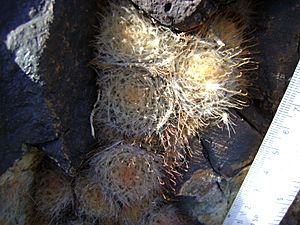Mammillaria pennispinosa facts for kids
Quick facts for kids Mammillaria pennispinosa |
|
|---|---|
 |
|
| Conservation status | |
| Scientific classification | |
| Genus: |
Mammillaria
|
| Species: |
pennispinosa
|
The Mammillaria pennispinosa is a special type of cactus that grows in Mexico. It's a unique plant because it's endemic to Mexico, which means it's found naturally nowhere else in the world! Specifically, it only grows in one small area in the state of Durango.
This cactus is quite rare. There are fewer than 1,250 of these plants left in the wild. They like to grow on volcanic rock in desert areas, which is a tough place for most plants to survive.
Contents
What is Mammillaria pennispinosa?
This cactus is part of the Mammillaria family, which is known for its round or cylinder-shaped cacti. These plants often have small bumps called tubercles, and spines that grow from them. The pennispinosa part of its name might refer to its unique spines.
Where Does It Live?
The Mammillaria pennispinosa cactus lives only in a specific part of Durango, Mexico. This area is a desert with lots of volcanic rocks. Cacti are amazing at surviving in dry places because they can store water in their stems. They have special adaptations, like thick skin and waxy coatings, to prevent water from evaporating.
Why is it Endangered?
The Mammillaria pennispinosa is listed as Critically Endangered by the International Union for Conservation of Nature (IUCN). This means it's facing a very high risk of disappearing forever in the wild.
There are a few reasons why this cactus is in danger:
- Small Population: With fewer than 1,250 plants, any small change can have a big impact.
- Limited Habitat: It only grows in one specific spot, so if that area is disturbed, the whole population is at risk.
- Habitat Loss: Like many plants, its home can be threatened by human activities or changes in the environment.
Conservation Efforts
Protecting the Mammillaria pennispinosa is very important. Scientists and conservation groups work to understand these plants better and protect their natural habitat. This helps ensure that future generations can still see and learn about this unique Mexican cactus.
See also
 In Spanish: Mammillaria pennispinosa para niños
In Spanish: Mammillaria pennispinosa para niños


